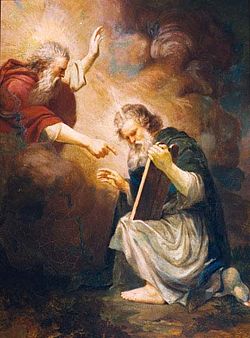
Back الوصايا العشر في اللاهوت الكاثوليكي Arabic Doctrina catòlica sobre els Deu Manaments Catalan Desatero přikázání v katolické teologii Czech Diez Mandamientos en la Iglesia católica Spanish Doctrine catholique sur le Décalogue French Doutrina católica sobre os dez mandamentos Galician Deset Božjih zapovijedi s katoličkog gledišta Croatian Sepuluh Perintah dalam teologi Katolik ID Dieci comandamenti nella teologia cattolica Italian Sepuluh Hukum dalam teologi Katolik Malay

| Part of a series on the |
| Ten Commandments |
|---|
 |
| Related articles |
The Ten Commandments are series of religious and moral imperatives that are recognized as a moral foundation in several of the Abrahamic religions, including the Catholic Church.[1] As described in the Old Testament books Exodus and Deuteronomy, the Commandments form part of a covenant offered by God to the Israelites to free them from the spiritual slavery of sin.[2] According to the Catechism of the Catholic Church—the official exposition of the Catholic Church's Christian beliefs—the Commandments are considered essential for spiritual good health and growth,[3] and serve as the basis for Catholic social teaching.[4] A review of the Commandments is one of the most common types of examination of conscience used by Catholics before receiving the sacrament of Penance.[5]
The Commandments appear in the earliest Church writings;[6] the Catechism states that they have "occupied a predominant place" in teaching the faith since the time of Augustine of Hippo (AD 354–430).[7][8] The Church had no official standards for religious instruction until the Fourth Lateran Council in 1215;[9] evidence suggests the Commandments were used in Christian education in the early Church[10] and throughout the Middle Ages.[9] The perceived lack of instruction in them by some dioceses was the basis of one of the criticisms launched against the Church by Protestant reformers.[11] Afterward, the first Church-wide catechism in 1566 provided "thorough discussions of each commandment", but gave greater emphasis to the seven sacraments.[12] The most recent Catechism devotes a large section to interpret each of the commandments.[7]
Church teaching of the Commandments is largely based on the Old and New Testaments and the writings of the early Church Fathers.[13] In the New Testament, Jesus acknowledged their validity and instructed his disciples to go further, demanding a righteousness exceeding that of the scribes and Pharisees.[14] Summarized by Jesus into two "Great Commandments" that teach love of God and love of neighbor,[7] they instruct individuals on their relationships with both. The first three commandments require reverence and respect for God's name, observation of the Lord's Day and prohibit the worship of other gods. The others deal with the relationships between individuals, such as that between parent and child; they include prohibitions against lying, stealing, murdering, adultery and covetousness.
- ^ Pottenger, p. 13
- ^ Cite error: The named reference
Barry85was invoked but never defined (see the help page). - ^ Cite error: The named reference
Kreeft201was invoked but never defined (see the help page). - ^ Cite error: The named reference
Carmodywas invoked but never defined (see the help page). - ^ O'Toole, p. 146
- ^ Cite error: The named reference
Hardonwas invoked but never defined (see the help page). - ^ a b c Schreck, p. 303
- ^ Catechism of the Catholic Church (2nd ed.). Libreria Editrice Vaticana. 2019. Paragraph 2065.
- ^ a b Cite error: The named reference
Bast4was invoked but never defined (see the help page). - ^ Cite error: The named reference
Pelikanwas invoked but never defined (see the help page). - ^ Cite error: The named reference
Bast3was invoked but never defined (see the help page). - ^ Cite error: The named reference
Brownwas invoked but never defined (see the help page). - ^ Cite error: The named reference
ccc2052-2074was invoked but never defined (see the help page). - ^ Kreeft, p. 202